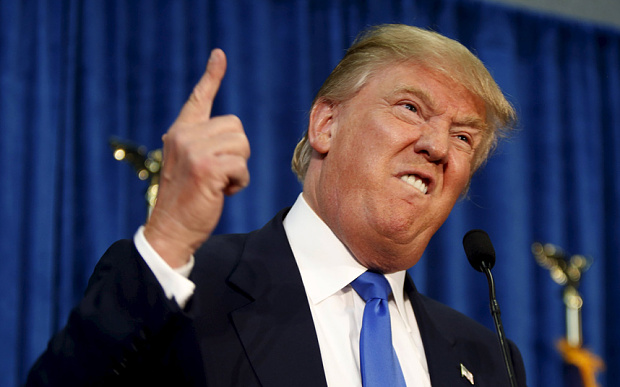The answer is related to his freedom and millions of dollars in debt…
UNITED STATES (Bloomberg) – Donald Trump is the luckiest man in the world. Unlike almost, well, everyone, he has been protected from the consequences of his own mistakes all his life.
Born into a wealthy family, his father’s money isolated him from lukewarm academic prospects and serial commercial repression (“I often say I’m a member of the lucky sperm club,” as he put it in one of his books).
Emerging as a reality show star in the early 2000s, Trump discovered that fame allowed him to be as predatory as he wanted without repercussions. (“When you’re a star, they let you do it.”) And his promotion to the White House in 2016 opened his eyes to the legal armor of the presidency, which he interpreted broadly and often inaccurately (“I have an Article II, under which I have the right to do what I want as president”).
Although Trump has made his way through, among other difficulties, poor grades, the threat of personal bankruptcy, accusations of sexual assault, an intensive federal investigation, and impeachment, he has advanced relatively unscathed and unrepentant. Wealth, celebrity, and the presidency have kept him afloat. All that isolation has also meant that he has not learned from his mistakes. All personal and public calculations have been postponed or diverted.
Now, however, Trump is seeing two threats looming after he leaves the White House in January. One is financial, the other legal. Neither is entirely under his control. Both can help explain, along with his perennial inability to accept defeat, why he won’t acknowledge that President-elect Joe Biden will succeed him and why he has enlisted the Republican Party to help him confuse Americans about the outcome of the presidential election.
Trump and the mosaic of businesses he houses within the Trump Organization are loaded with more than $1 billion in debt, which Forbes’ Dan Alexander has counted on for good. In recent years, a portion of that total has been disclosed in the President’s financial disclosures, on file with the Government Ethics Office. The New York Times recently revealed that Trump has personally guaranteed $421 million of the debt, with more than $300 million due within four years.
In other words, Trump owes a great deal of money that he may have to pay in an economy battered by COVID-19, in which his industries (hotels, entertainment, urban real estate) have been particularly hard hit. Forbes estimates that his assets are worth $3.7 billion; Bloomberg News puts it at about $3.2 billion. It is not going bankrupt. But if the economy continues to struggle in the coming months, those valuations will be put to the test.
Much of what Trump has is not liquid capital, which means it may be difficult to sell assets quickly if he needs to raise funds. As an example, Trump’s most valuable holdings are minority stakes in two properties controlled by Vornado Realty Trust. Rumors of distress sales could further depress the value of his portfolio.
Another thing that would weaken Trump’s ability to negotiate financial settlements or debt relief is leaving the presidency.
On the accounts’ legal side, Trump, his children, and his company face aggressive investigations into their finances, accounting practices, and tax payments.
According to the court of appeals documents, the Manhattan District Attorney’s Office is investigating Trump for possible tax fraud and falsification of business records. In this investigation, which also examines the President’s payment to silence two women who allegedly had sexual encounters with him, the district attorney’s office looks at eight years of Trump’s tax returns. It is also looking into whether Trump inflated his property’s value and other assets to obtain funds from lenders and investors.
New York Attorney General Letitia James has initiated another investigation, focusing on whether the Trump Organization and the Trump family manipulated the valuations to obtain funds or tax benefits. The James investigation is a civil case, which could lead to heavy financial penalties against Trump, but no jail time (unless there are reasons to rephrase it as a criminal case). However, the Vance investigation is a criminal matter, and if Trump’s team is convicted of serious crimes, jail time is a possibility.
Trump’s team has fought the Vance investigation and has even argued in the U.S. Supreme Court that an incumbent president is immune from state criminal prosecution. While the court rejected that notion in a landmark ruling over the summer, it would become a moot point anywhere once Trump is no longer President.
As Trump pushed out of the legal pit surrounding the White House becomes, for the most part, a Trump who can be sued and penalized like any other American citizen. That could also give new traction to sexual assault cases against him.
It is unclear how aggressive law enforcement officials in the Biden Administration will be toward Trump. They may resurrect some of the obstruction charges that have fallen by the wayside since former Special Counsel Robert Mueller completed his investigation. On the other hand, the political storm that could be ignited could persuade Biden to stop.
What is clear is that money and Trump’s freedom are at stake. As he faces the loss of the 2020 election, he will continue to respond in fierce and unpredictable ways, like a man who for 74 years has been used to getting his way.



